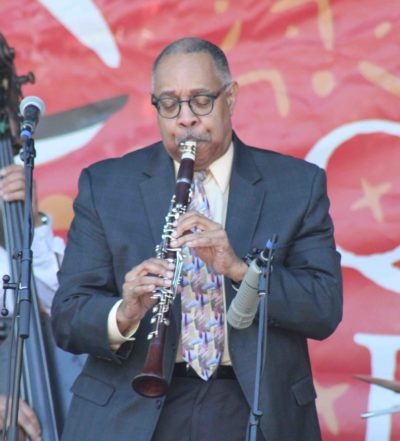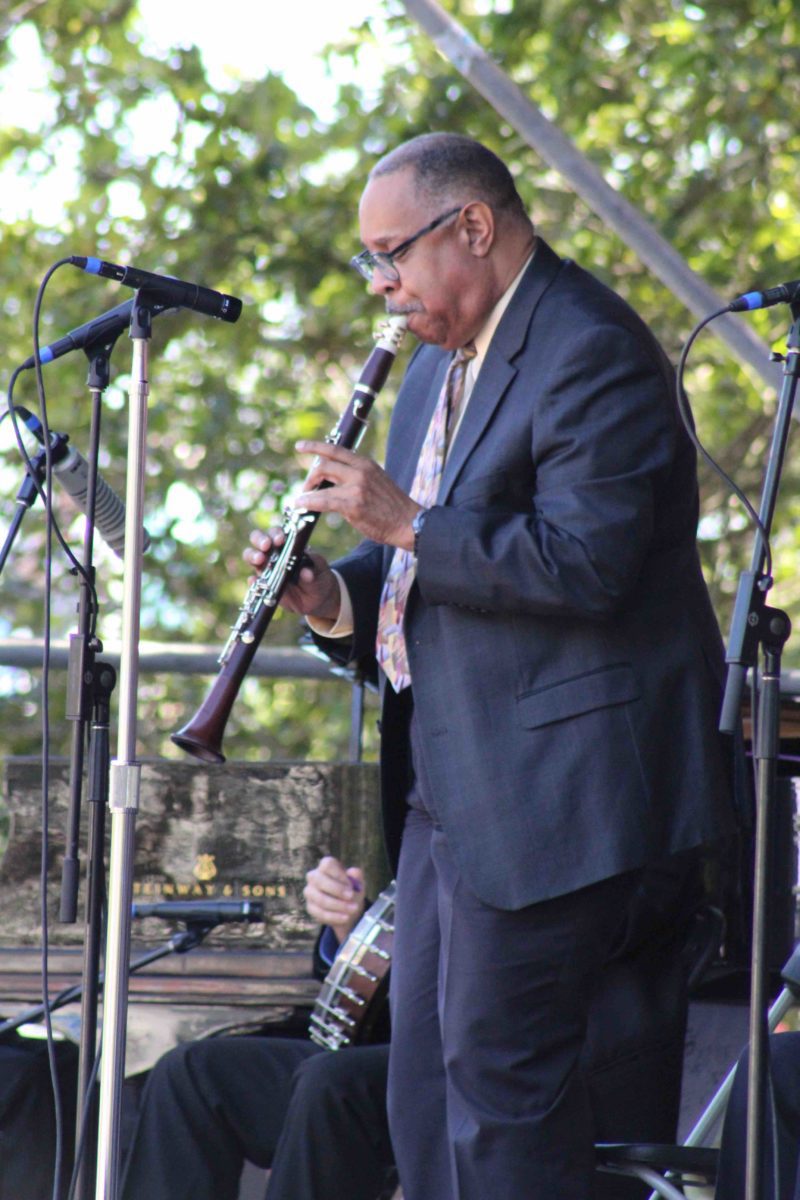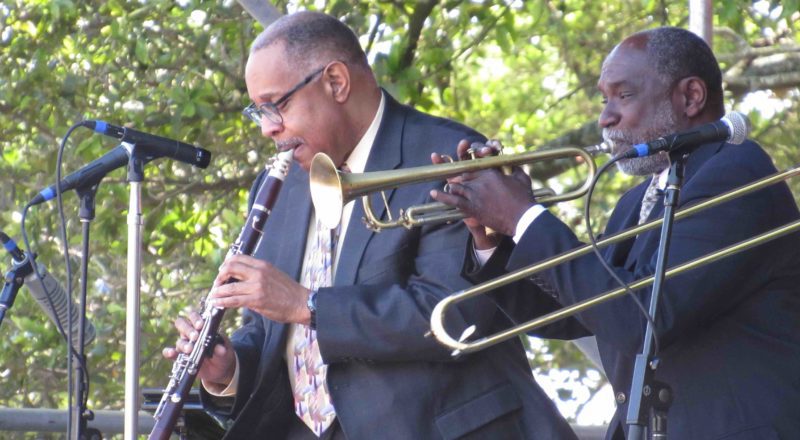INTERVIEW: Dr. Michael White celebrates NOLA’s 300th

Dr. Michael White is one of the preeminent clarinetists in the world, a man who strives to honor the expansive wonders of traditional jazz in his native city of New Orleans. This year, to mark the Big Easy’s 300th birthday, White has released a new album of jazz tunes entitled Tricentennial Rag from Basin Street Records.
The new recording has a bevy of songs that celebrate New Orleans and explore its many musical contributions. There’s “Frenchmen Street Strut” about the famed corridor of clubs and restaurants that still packs in the crowds, and “On Mardi Gras Day,” a traditional take on NOLA’s most famous holiday. He also includes religious songs, like “I Saw Jesus Standing in the Water,” and he even leaves a spot for “When the Saints Go Marching In.”
“I was writing songs in August of last year, and I thought about the idea that since this is the 300-year anniversary of New Orleans I wanted to do a recording that reflected different aspects of what I think of as New Orleans’ most important cultural contribution: jazz,” White said in a recent phone interview. “I wanted to do something that covered the genres of traditional music — like blues and rags and things like that, hymns — but without duplicating what came before, but to mainly write new songs based on the principles of traditional music and my own personal life experiences in it. And so that’s kind of how it came about, and I wrote some of the songs with different aspects of New Orleans and New Orleans culture in mind and with specific musicians in mind.”
White has been playing clarinet for more than 40 years and has appeared on more than 50 recordings. He was raised in the Carrollton neighborhood of New Orleans and took to music at a young age.
“I started playing at the age of 14 when I was in high school, and I had private lessons from the band director at St. Augustine High School,” he remembered. “Eventually I joined the band, and I became a member of the Marching 100th, the marching band, and also the symphonic band at the school. I had private lessons for about three years, and that’s kind of how I got into music.”
He continued to make a name for himself, making the rounds at social club parades and jazz funerals, playing with the likes of Ernest “Doc” Paulin and his brass band. He also learned from Danny Barker and George “Kid Sheik Cola” Colar. The clarinet playing came later, after he listened to an influential recording by George Lewis.

His abiding interest in the clarinet and the history of NOLA music has served him well. In the past few decades, he has fronted the Original Liberty Jazz Band, Liberty Brass Band and Michael White Quartet. He also sits in for the Young Tuxedo Brass Band. His recording history is as extensive as his gigging history. He has appeared on albums with Wynton Marsalis, Eric Clapton, Taj Mahal, Paul Simon and Marianne Faithful.
For Tricentennial Rag, White mined the history of New Orleans music that has so influenced him. Take, for example, “Frenchmen Street Strut.”
“It was a street Jelly Roll Morton lived on, and it is the hot spot of music today,” he said. “They have clubs there. I don’t really play in a lot of clubs. I play at Snug Harbor, which is down there, which I enjoy quite a lot. So Frenchmen Street is kind of like a hot spot, so just the whole history of Frenchmen Street and its importance in New Orleans music, like from the early days to now, was the inspiration for that.”
He added: “I’m also a very, very big fan of the music, and I still listen quite a lot all the time, just mainly for enjoyment. And I’ve been doing this for over 40 years, so I have a lot of music simmering around in my head. … And what happens is a lot of times I’m inspired by events or people or different things. Some ideas will come and go. Sometimes I just start writing those down. I’m always reading anyway about the history of New Orleans. It’s all kind of there.”
White recognizes the important significance of New Orleans as the birthplace and current nexus of traditional jazz. He appreciates that there are many ideas on how to define jazz, but the city allows any and all interpretations — a musical gumbo of styles and influences.
“The spirit of the city is still very unique and strong and conducive to what traditional New Orleans music is about,” he said. “I think that for bands, [the music is] important because it still captures timeless universal passions and emotions, and also there are a number of really interesting lessons that we can learn from the music about basic concepts in our society — like freedom, democracy, teamwork, individual expression. There’s a lot, and you can relate this music to the most contemporary of ideas or issues. One of the things that I started doing on my jobs in the last year is sometimes I’ll go on the job and ask the audience to give me some idea, some concept or feeling or emotion, and we’ll make up a song on the spot based on that. So that shows that the music can still be very much contemporary and alive and pertinent in today’s world and society.”
Another selection off Tricentennial Rag that White is proud of is “On Mardi Gras Day.” The song is something of a rarity for the clarinetist because he doesn’t remember ever recording an original tune about the most important date on the calendar in NOLA.
“Thinking about the 300-year history of New Orleans, that’s one of the most astounding and best known aspects of the city’s traditions,” White said. “So I grew up on Mardi Gras. I grew up loving it and experiencing it as a child and then marching in high school bands and then playing in brass bands, so I was just recalling the good spirits and the fun that people have on Mardi Gras. And that’s an important part of this tricentennial history of New Orleans.”
Another tune, “Mandeville Stomp,” is inspired by Morton, while mid-tempo blues can be found on “Blues on the Bayou.” There’s even room for an old-style love song, “What I Wouldn’t Do to Be With You.”
The new album, which rose to #5 on the Billboard Jazz Charts and #3 on the Traditional Jazz Charts, tries to look back, consider the present and ponder about the future. What are the origins of New Orleans music? What does its modern-day interpretation sound like? What might the future hold?
“We’re looking at everything — good, bad, great, all the things in the history of the city,” he said. “It’s an important time to reflect upon that, so again that’s why I wanted the basis of the CD to be really core traditional in style and feel and nature because that has been our most important contribution, but also the thing that has the deepest philosophical meaning in terms of some of our core values and expressions in life.”
By John Soltes / Publisher / John@HollywoodSoapbox.com
Dr. Michael White’s new album is Tricentennial Rag, put out by Basin Street Records. Click here for more information.

